Edie Melson's Blog, page 363
October 14, 2015
Publishing As a Second Language—The On's of Article Writing
by Linda Gilden @LindaGilden
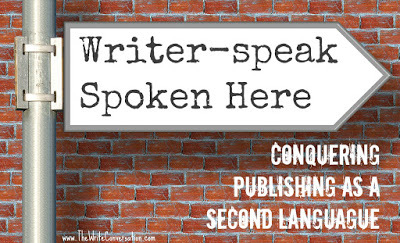 Several terms you will hear that pertain to article writing begin with the word “on.”
Several terms you will hear that pertain to article writing begin with the word “on.”
ON SpeculationMany times you will hear this term shortened to on spec. This usually follows a query and issues an invitation to send your article on speculation. That is a tentative “yes" meaning that once your article is received they will read it carefully and if it fits their needs, will accept it. Acceptance on speculation leaves the door open for the publisher to reject the work if it is not up to the standards set in the query. If you have studied the publication and its guidelines and have written a strong query letter that shows excellent writing skills, the possibility of acceptance for an on spec article is high.
“I don’t worry about money, this is my ministry.” How many times have I heard these words at Christian writers conferences when the subject of money comes up? Many writers seem to think that talking about making money for your writing is a sin. But the Bible reminds us “the worker deserves his wages” (1 Timothy 5:18). That doesn’t just apply to construction workers, teachers, or bank executives. Writers are on that list as well. No matter what market you write for, secular or inspirational, your time is valuable to you and to those you write for.There are several “on’s” pertaining to payment you should be familiar with.
 ON AcceptanceSimply put, payment on acceptance is that once your article has been accepted for publication, you will be paid within a reasonable amount of time. This is the preference of most writers.
ON AcceptanceSimply put, payment on acceptance is that once your article has been accepted for publication, you will be paid within a reasonable amount of time. This is the preference of most writers.
ON PublicationThis term means that even though your article has been accepted, you will not be paid until the article is in print. Writers don’t like this as well because your article could be accepted one day and not published for a year or two later. Occasionally, the time could be even longer.
Another important “on” is on time.
 On TimeIt seems understood that if you promise an article by a certain deadline, you will have it done. The importance of meeting deadlines is paramount for writers. Publishers need to know they can trust writers to deliver what they promise when they promise it. If you get into a pinch and need a few more days for an assignment, contact your editor and ask for a few days of grace. Keep him or her posted on your progress if there is a question as to whether or not you can meet your deadline.
On TimeIt seems understood that if you promise an article by a certain deadline, you will have it done. The importance of meeting deadlines is paramount for writers. Publishers need to know they can trust writers to deliver what they promise when they promise it. If you get into a pinch and need a few more days for an assignment, contact your editor and ask for a few days of grace. Keep him or her posted on your progress if there is a question as to whether or not you can meet your deadline.
Paying attention to the details of the writing business is one of the keys to being a successful writer. So don’t hesitate to ask a fellow writer if you run into a PSL term that you don’t understand! Feel free to post questions about PSL in the comment section and we will address those terms here in the future!
TWEETABLEPublishing as a Second Language - the On's of Article #Writing - @LindaGilden on @EdieMelson (Click to Tweet)
 Linda Gilden is a wife, mother, and grandmother. She finds great joy (and excellent writing material) in time spent with her family. Her favorite activity is floating in a pool with a good book surrounded by splashing children!
Linda Gilden is a wife, mother, and grandmother. She finds great joy (and excellent writing material) in time spent with her family. Her favorite activity is floating in a pool with a good book surrounded by splashing children!
To find out more about Linda, her writing, and her ministry, visit www.lindagilden.com . You can also connect with her on Twitter @LindaGilden and Facebook at Author Linda Gilden.
 Several terms you will hear that pertain to article writing begin with the word “on.”
Several terms you will hear that pertain to article writing begin with the word “on.”ON SpeculationMany times you will hear this term shortened to on spec. This usually follows a query and issues an invitation to send your article on speculation. That is a tentative “yes" meaning that once your article is received they will read it carefully and if it fits their needs, will accept it. Acceptance on speculation leaves the door open for the publisher to reject the work if it is not up to the standards set in the query. If you have studied the publication and its guidelines and have written a strong query letter that shows excellent writing skills, the possibility of acceptance for an on spec article is high.
“I don’t worry about money, this is my ministry.” How many times have I heard these words at Christian writers conferences when the subject of money comes up? Many writers seem to think that talking about making money for your writing is a sin. But the Bible reminds us “the worker deserves his wages” (1 Timothy 5:18). That doesn’t just apply to construction workers, teachers, or bank executives. Writers are on that list as well. No matter what market you write for, secular or inspirational, your time is valuable to you and to those you write for.There are several “on’s” pertaining to payment you should be familiar with.
 ON AcceptanceSimply put, payment on acceptance is that once your article has been accepted for publication, you will be paid within a reasonable amount of time. This is the preference of most writers.
ON AcceptanceSimply put, payment on acceptance is that once your article has been accepted for publication, you will be paid within a reasonable amount of time. This is the preference of most writers.ON PublicationThis term means that even though your article has been accepted, you will not be paid until the article is in print. Writers don’t like this as well because your article could be accepted one day and not published for a year or two later. Occasionally, the time could be even longer.
Another important “on” is on time.
 On TimeIt seems understood that if you promise an article by a certain deadline, you will have it done. The importance of meeting deadlines is paramount for writers. Publishers need to know they can trust writers to deliver what they promise when they promise it. If you get into a pinch and need a few more days for an assignment, contact your editor and ask for a few days of grace. Keep him or her posted on your progress if there is a question as to whether or not you can meet your deadline.
On TimeIt seems understood that if you promise an article by a certain deadline, you will have it done. The importance of meeting deadlines is paramount for writers. Publishers need to know they can trust writers to deliver what they promise when they promise it. If you get into a pinch and need a few more days for an assignment, contact your editor and ask for a few days of grace. Keep him or her posted on your progress if there is a question as to whether or not you can meet your deadline.Paying attention to the details of the writing business is one of the keys to being a successful writer. So don’t hesitate to ask a fellow writer if you run into a PSL term that you don’t understand! Feel free to post questions about PSL in the comment section and we will address those terms here in the future!
TWEETABLEPublishing as a Second Language - the On's of Article #Writing - @LindaGilden on @EdieMelson (Click to Tweet)
 Linda Gilden is a wife, mother, and grandmother. She finds great joy (and excellent writing material) in time spent with her family. Her favorite activity is floating in a pool with a good book surrounded by splashing children!
Linda Gilden is a wife, mother, and grandmother. She finds great joy (and excellent writing material) in time spent with her family. Her favorite activity is floating in a pool with a good book surrounded by splashing children!To find out more about Linda, her writing, and her ministry, visit www.lindagilden.com . You can also connect with her on Twitter @LindaGilden and Facebook at Author Linda Gilden.
Published on October 14, 2015 01:00
October 13, 2015
Encouraging Words for Writers
by Cindy Sproles @CindyDevoted
An Open Letter to Authors
Dear Authors,
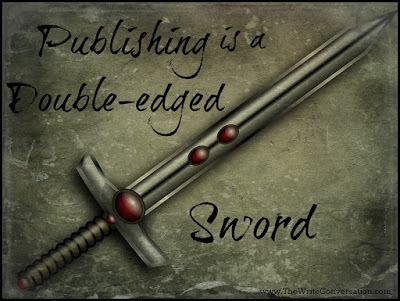 Publishing is double-edged sword. It brings us great joy and equal frustration. Daily publishers post information about the terrible state of the industry, driving us to ask the question, “Why do we bother?”
Publishing is double-edged sword. It brings us great joy and equal frustration. Daily publishers post information about the terrible state of the industry, driving us to ask the question, “Why do we bother?”
It’s this question that prompts my letter to authors, both new and seasoned. Quitting is not an option, but strength, determination, and wherewithal must supersede that which discourages you. Follow this wisdom and know that despite the odds you are called to a task. You are trained to move ahead—groomed to withstand the wait.*Do not let your heart be troubled . . .(John 14:1 NIV) for you are called to a mission by a power far greater than that of a publisher. When rejection storms your heart, do not cover your face, but open your arms and embrace it for, it is the rejection that spurs us to hone the craft – to strive to be better. A troubled heart cannot speak clearly nor can it work effectively, but when that worry is placed in the hands of the Great Writer, it will flow effortlessly and it will touch deeply.
 * Trust in the Lord with all your heart and lean not on your own understanding; in all your ways submit to him . . . (Proverbs 3:5-6 NIV). When you take success upon yourself, your eyes become clouded by selfishness and greed. But when you trust your ways to Him, you are – in essence, acknowledging your work was inspired and gifted to you as the tool through which it is to be presented. Write the words. Write them to the best of your ability. Show an attitude of willingness and teachable spirit as you work with editors and publishers. Then trust the work back into the hands of the Great Inspiration and let Him do with it as He sees fit. After all, it was His to begin with. He simply chose you as the best communicator of the story.
* Trust in the Lord with all your heart and lean not on your own understanding; in all your ways submit to him . . . (Proverbs 3:5-6 NIV). When you take success upon yourself, your eyes become clouded by selfishness and greed. But when you trust your ways to Him, you are – in essence, acknowledging your work was inspired and gifted to you as the tool through which it is to be presented. Write the words. Write them to the best of your ability. Show an attitude of willingness and teachable spirit as you work with editors and publishers. Then trust the work back into the hands of the Great Inspiration and let Him do with it as He sees fit. After all, it was His to begin with. He simply chose you as the best communicator of the story.
* There is a time for everything, and a season for every activity under the heavens . . . (Ecclesiastes 3:1 NIV). Keep in mind the publishing industry a huge wheel. Placed around the wheel are genres, articles, and needs that slowly circle. Today your work may not be at the top of the wheel, but implore patience and trust, and the wheel will spin, eventually landing on your time . . . your work . . . your season. This is when your work begins to take wing and fly. Your work grows from rejections to rewriting, editing, and honing. With each revisit, more and more improvement is made. And when your time rises to the top, it will be . . . amazing.
 * Rejoice in the Lord always. I will say it again: Rejoice! (Philippians 4:4 NIV). When success comes your way, do not forget from whence it came. Rejoice in the success of the completion of your work but do not claim credit when the praise belongs to the Great Chooser – for He chose you, gifted you, and blessed you. Do not allow the praise of good work make you haughty, but remain of humble spirit, filled with kindness and giving the glory to Him who chose you to complete His work. Rejoice fully in the completion of the work. Do not take on the attitude of entitlement – instead, write, give, serve others with your skill and the Great Giver will take your efforts and multiply them ten-fold. Should hard times fall over you in the midst of your joy, rejoice in the Lord always for there is comfort in turning your fears of failure to the Giver of Peace.
* Rejoice in the Lord always. I will say it again: Rejoice! (Philippians 4:4 NIV). When success comes your way, do not forget from whence it came. Rejoice in the success of the completion of your work but do not claim credit when the praise belongs to the Great Chooser – for He chose you, gifted you, and blessed you. Do not allow the praise of good work make you haughty, but remain of humble spirit, filled with kindness and giving the glory to Him who chose you to complete His work. Rejoice fully in the completion of the work. Do not take on the attitude of entitlement – instead, write, give, serve others with your skill and the Great Giver will take your efforts and multiply them ten-fold. Should hard times fall over you in the midst of your joy, rejoice in the Lord always for there is comfort in turning your fears of failure to the Giver of Peace.
* Take delight in the Lord, and he will give you the desires of your heart. (Psalms 37:4 NIV). Your passion and desire is infectious and when you work with an attitude of happiness and giving, the Lord delights in you and He gifts you according to His will, the desires of your heart. When you put forth your best effort to write compelling pieces, then what you craft can be used to touch hearts. Grasp hold of gentleness for the words you are gifted may be tough and you must be prepared to extend compassion to those who do not understand. Write truth. Do not preach it. Write it in love and tenderness and the One who touched your senses with this idea will bless the task. Be an imitator of the Father, sculpting words and phrases that touch and inspire others.
*May the words of my mouth and the meditations of my heart be pleasing in your sight, Lord my Rock and my Redeemer (Psalms 19:14 NIV). Remember He knew you before you were formed in your mother’s womb. He knows the plans He has for you. So trust. Practice. Learn. Share. Give of yourself. Be faithful and intentional as you write the words He places on your heart. Remember it is not about you, rather what can you do to expand the Kingdom.
Sometimes words of wisdom are hard to endure but dear writer, the Great Author will work through you and your skills of writing—be it fiction or truth. Show the world the light of Truth because the Light is where the world needs to look. These are words written in love to guide you through discouragement and temptation and point your heart toward Him. Now use your gift. Write with the pen of the Great I Am and change lives.
What can you add to these words of encouragement? Share your favorite verse or quote in the comments section below.
Don't forget to join the conversation!
TWEETABLESEncouraging words for writers - via author Cindy Sproles @CindyDevoted on @EdieMelson (Click to Tweet)
#Publishing is a double-edged sword - #encouragement from @CindyDevoted on @EdieMelson (Click to Tweet)
 Cindy Sproles is an author and popular speaker. She is the cofounder of Christian Devotions ministries and managing editor of Straight Street Books and SonRise Devotionals, imprints of Lighthouse Publishing of the Carolinas. Cindy is the executive editor of www.christiandevotions.us and www.inspireafire.com. She teaches at writers conferences nationwide and directs The Asheville Christian Writers Conference - Writers Boot Camp.
Cindy Sproles is an author and popular speaker. She is the cofounder of Christian Devotions ministries and managing editor of Straight Street Books and SonRise Devotionals, imprints of Lighthouse Publishing of the Carolinas. Cindy is the executive editor of www.christiandevotions.us and www.inspireafire.com. She teaches at writers conferences nationwide and directs The Asheville Christian Writers Conference - Writers Boot Camp.
She is the author of two devotionals, He Said, She Said - Learning to Live a Life of Passion and New Sheets - Thirty Days to Refine You into the Woman You Can Be. Cindy's debut novel, Mercy's Rain, is available at major retailers. Visit Cindy at www.cindysproles.com and book her for your next conference or ladies retreat. Also connect with her on Facebook and Twitter.
An Open Letter to Authors
Dear Authors,
 Publishing is double-edged sword. It brings us great joy and equal frustration. Daily publishers post information about the terrible state of the industry, driving us to ask the question, “Why do we bother?”
Publishing is double-edged sword. It brings us great joy and equal frustration. Daily publishers post information about the terrible state of the industry, driving us to ask the question, “Why do we bother?”It’s this question that prompts my letter to authors, both new and seasoned. Quitting is not an option, but strength, determination, and wherewithal must supersede that which discourages you. Follow this wisdom and know that despite the odds you are called to a task. You are trained to move ahead—groomed to withstand the wait.*Do not let your heart be troubled . . .(John 14:1 NIV) for you are called to a mission by a power far greater than that of a publisher. When rejection storms your heart, do not cover your face, but open your arms and embrace it for, it is the rejection that spurs us to hone the craft – to strive to be better. A troubled heart cannot speak clearly nor can it work effectively, but when that worry is placed in the hands of the Great Writer, it will flow effortlessly and it will touch deeply.
 * Trust in the Lord with all your heart and lean not on your own understanding; in all your ways submit to him . . . (Proverbs 3:5-6 NIV). When you take success upon yourself, your eyes become clouded by selfishness and greed. But when you trust your ways to Him, you are – in essence, acknowledging your work was inspired and gifted to you as the tool through which it is to be presented. Write the words. Write them to the best of your ability. Show an attitude of willingness and teachable spirit as you work with editors and publishers. Then trust the work back into the hands of the Great Inspiration and let Him do with it as He sees fit. After all, it was His to begin with. He simply chose you as the best communicator of the story.
* Trust in the Lord with all your heart and lean not on your own understanding; in all your ways submit to him . . . (Proverbs 3:5-6 NIV). When you take success upon yourself, your eyes become clouded by selfishness and greed. But when you trust your ways to Him, you are – in essence, acknowledging your work was inspired and gifted to you as the tool through which it is to be presented. Write the words. Write them to the best of your ability. Show an attitude of willingness and teachable spirit as you work with editors and publishers. Then trust the work back into the hands of the Great Inspiration and let Him do with it as He sees fit. After all, it was His to begin with. He simply chose you as the best communicator of the story.* There is a time for everything, and a season for every activity under the heavens . . . (Ecclesiastes 3:1 NIV). Keep in mind the publishing industry a huge wheel. Placed around the wheel are genres, articles, and needs that slowly circle. Today your work may not be at the top of the wheel, but implore patience and trust, and the wheel will spin, eventually landing on your time . . . your work . . . your season. This is when your work begins to take wing and fly. Your work grows from rejections to rewriting, editing, and honing. With each revisit, more and more improvement is made. And when your time rises to the top, it will be . . . amazing.
 * Rejoice in the Lord always. I will say it again: Rejoice! (Philippians 4:4 NIV). When success comes your way, do not forget from whence it came. Rejoice in the success of the completion of your work but do not claim credit when the praise belongs to the Great Chooser – for He chose you, gifted you, and blessed you. Do not allow the praise of good work make you haughty, but remain of humble spirit, filled with kindness and giving the glory to Him who chose you to complete His work. Rejoice fully in the completion of the work. Do not take on the attitude of entitlement – instead, write, give, serve others with your skill and the Great Giver will take your efforts and multiply them ten-fold. Should hard times fall over you in the midst of your joy, rejoice in the Lord always for there is comfort in turning your fears of failure to the Giver of Peace.
* Rejoice in the Lord always. I will say it again: Rejoice! (Philippians 4:4 NIV). When success comes your way, do not forget from whence it came. Rejoice in the success of the completion of your work but do not claim credit when the praise belongs to the Great Chooser – for He chose you, gifted you, and blessed you. Do not allow the praise of good work make you haughty, but remain of humble spirit, filled with kindness and giving the glory to Him who chose you to complete His work. Rejoice fully in the completion of the work. Do not take on the attitude of entitlement – instead, write, give, serve others with your skill and the Great Giver will take your efforts and multiply them ten-fold. Should hard times fall over you in the midst of your joy, rejoice in the Lord always for there is comfort in turning your fears of failure to the Giver of Peace.* Take delight in the Lord, and he will give you the desires of your heart. (Psalms 37:4 NIV). Your passion and desire is infectious and when you work with an attitude of happiness and giving, the Lord delights in you and He gifts you according to His will, the desires of your heart. When you put forth your best effort to write compelling pieces, then what you craft can be used to touch hearts. Grasp hold of gentleness for the words you are gifted may be tough and you must be prepared to extend compassion to those who do not understand. Write truth. Do not preach it. Write it in love and tenderness and the One who touched your senses with this idea will bless the task. Be an imitator of the Father, sculpting words and phrases that touch and inspire others.
*May the words of my mouth and the meditations of my heart be pleasing in your sight, Lord my Rock and my Redeemer (Psalms 19:14 NIV). Remember He knew you before you were formed in your mother’s womb. He knows the plans He has for you. So trust. Practice. Learn. Share. Give of yourself. Be faithful and intentional as you write the words He places on your heart. Remember it is not about you, rather what can you do to expand the Kingdom.
Sometimes words of wisdom are hard to endure but dear writer, the Great Author will work through you and your skills of writing—be it fiction or truth. Show the world the light of Truth because the Light is where the world needs to look. These are words written in love to guide you through discouragement and temptation and point your heart toward Him. Now use your gift. Write with the pen of the Great I Am and change lives.
What can you add to these words of encouragement? Share your favorite verse or quote in the comments section below.
Don't forget to join the conversation!
TWEETABLESEncouraging words for writers - via author Cindy Sproles @CindyDevoted on @EdieMelson (Click to Tweet)
#Publishing is a double-edged sword - #encouragement from @CindyDevoted on @EdieMelson (Click to Tweet)
 Cindy Sproles is an author and popular speaker. She is the cofounder of Christian Devotions ministries and managing editor of Straight Street Books and SonRise Devotionals, imprints of Lighthouse Publishing of the Carolinas. Cindy is the executive editor of www.christiandevotions.us and www.inspireafire.com. She teaches at writers conferences nationwide and directs The Asheville Christian Writers Conference - Writers Boot Camp.
Cindy Sproles is an author and popular speaker. She is the cofounder of Christian Devotions ministries and managing editor of Straight Street Books and SonRise Devotionals, imprints of Lighthouse Publishing of the Carolinas. Cindy is the executive editor of www.christiandevotions.us and www.inspireafire.com. She teaches at writers conferences nationwide and directs The Asheville Christian Writers Conference - Writers Boot Camp. She is the author of two devotionals, He Said, She Said - Learning to Live a Life of Passion and New Sheets - Thirty Days to Refine You into the Woman You Can Be. Cindy's debut novel, Mercy's Rain, is available at major retailers. Visit Cindy at www.cindysproles.com and book her for your next conference or ladies retreat. Also connect with her on Facebook and Twitter.
Published on October 13, 2015 01:00
October 12, 2015
What Do I Need in My Blog’s Sidebar—Blogging for Writers, Part 6
by Edie Melson @EdieMelson
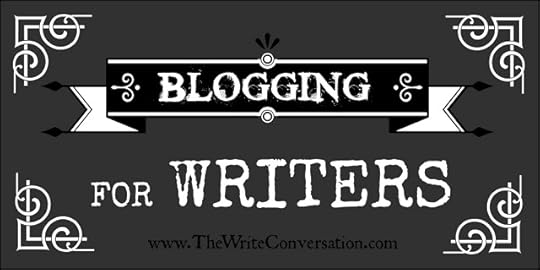
I’m going to break it down and answer the question, “What do I need in my blog’s sidebar?”
Definition: Gadget, Widget, WhateverDepending on which blogging platform you use, the names of the plug-ins for your blog are different. Blogger: here they’re called Gadgets and you can find them by going to your Blogger dashboard and clicking on Layout. There are several pages, but stick with the tab that says BASIC. These (at the moment there are 28) gadgets have been vetted by Blogger and won’t secretly imbed some kind of Trojan horse bug into your blog. The BASIC gadgets are the only ones guaranteed. If you want to use any of the others, be sure to do your homework and verify they come from reputable sources and can’t have been tampered with.WordPress: here they’re called Widgets and you can find them by going to your blog’s dashboard and clicking on Appearance. WordPress has thousands of widgets, some free, some for sale. You can find Widget to fit a WordPress sight all over the Internet. Again, unless the Widget comes directly from WordPress, be sure to verify they come from reputable sources and can’t have been tampered with.Before I get to the specific gadgets you should include in your sidebar, let me give you some basic information about the purpose of that section of your blog. Your sidebar is first and foremost, your call to action for your reader. That isn’t just a sales term, but in this situation, it’s what you want your reader to do (like subscribe to your site or follow you on social media). Beyond that, the order you put your Gadgets in is their order of importance.
Blogger: here they’re called Gadgets and you can find them by going to your Blogger dashboard and clicking on Layout. There are several pages, but stick with the tab that says BASIC. These (at the moment there are 28) gadgets have been vetted by Blogger and won’t secretly imbed some kind of Trojan horse bug into your blog. The BASIC gadgets are the only ones guaranteed. If you want to use any of the others, be sure to do your homework and verify they come from reputable sources and can’t have been tampered with.WordPress: here they’re called Widgets and you can find them by going to your blog’s dashboard and clicking on Appearance. WordPress has thousands of widgets, some free, some for sale. You can find Widget to fit a WordPress sight all over the Internet. Again, unless the Widget comes directly from WordPress, be sure to verify they come from reputable sources and can’t have been tampered with.Before I get to the specific gadgets you should include in your sidebar, let me give you some basic information about the purpose of that section of your blog. Your sidebar is first and foremost, your call to action for your reader. That isn’t just a sales term, but in this situation, it’s what you want your reader to do (like subscribe to your site or follow you on social media). Beyond that, the order you put your Gadgets in is their order of importance.
The gadget your readers sees first, is the most important thing. The one they see next is second in the list of importance, etc.
What Gadgets in What Order?Here are the two things I think every blog needs at the top of the sidebar:Subscription Links: this is where your reader can sign up for blog updates sent to their email or their RSS feed. You don’t need to know what an RSS feed is, but you do need to provide a way for your audience to get updates through a reader. For blogger, the gadget for RSS is the one labeled Subscription Links. The one for email signups is labeled Follow by Email. Social Media Follow Buttons:These buttons are generally generated on the site of the platform you want to share. For example you have to go to Facebook to create your FB Follow or Like Button and Twitter to Create your Twitter button. That's the same no matter which site you want to link to, Instagram, LinkedIn, Pinterest, etc. Once you’ve followed the steps on the social media site and created the codes for your buttons, you’ll use the HTML Gadget to install them on your sidebar.
Social Media Follow Buttons:These buttons are generally generated on the site of the platform you want to share. For example you have to go to Facebook to create your FB Follow or Like Button and Twitter to Create your Twitter button. That's the same no matter which site you want to link to, Instagram, LinkedIn, Pinterest, etc. Once you’ve followed the steps on the social media site and created the codes for your buttons, you’ll use the HTML Gadget to install them on your sidebar.
More GadgetsThere are lots of gadgets you can add to your site. You can also add them again and again, for different things. Most of them can be used multiple times. here are the things you might find helpful to include:The Blogging Schedule for My Site: I put this one close to the top and you won’t need this if you only post once or twice a week. For this I use the Text Gadget.Books I Have to Sell or PromoteBlogging ListMost Popular PostsLinks to Other Sites
 Gadgets You Do NOT NeedI don’t recommend you have the About Me information in a gadget. Instead I recommend you put that information into a Page on your blog.
Gadgets You Do NOT NeedI don’t recommend you have the About Me information in a gadget. Instead I recommend you put that information into a Page on your blog.
There are a lot of things you can add to your sidebar, but be careful. It’s important not to let your sidebar get too cluttered. Just add the things you need, as you need them.
What gadgets/widgets do you look for when you visit a blog? Leave your thoughts in the comments section below.
Don't forget to join the conversation!Blessings,Edie
TWEETABLESIt’s not just what’s IN your blog’s sidebar—it’s the ORDER - @EdieMelson (Click to Tweet)
What you have in your blog’s sidebar matters – tips from @EdieMelson (Click to Tweet)
Blogging For Writers: If you've missed the previous posts in this series, here are the direct links:
Part 1 - Blog or Website, Which Does a Writer Really Need
Part 2 - So What Do I Blog About
Part 3 - The Dos & Don'ts of Blogging
Part 4 - How Fast Should a Blog Grow
Part 5 - Tips for Getting More Comments on Your Blog

I’m going to break it down and answer the question, “What do I need in my blog’s sidebar?”
Definition: Gadget, Widget, WhateverDepending on which blogging platform you use, the names of the plug-ins for your blog are different.
 Blogger: here they’re called Gadgets and you can find them by going to your Blogger dashboard and clicking on Layout. There are several pages, but stick with the tab that says BASIC. These (at the moment there are 28) gadgets have been vetted by Blogger and won’t secretly imbed some kind of Trojan horse bug into your blog. The BASIC gadgets are the only ones guaranteed. If you want to use any of the others, be sure to do your homework and verify they come from reputable sources and can’t have been tampered with.WordPress: here they’re called Widgets and you can find them by going to your blog’s dashboard and clicking on Appearance. WordPress has thousands of widgets, some free, some for sale. You can find Widget to fit a WordPress sight all over the Internet. Again, unless the Widget comes directly from WordPress, be sure to verify they come from reputable sources and can’t have been tampered with.Before I get to the specific gadgets you should include in your sidebar, let me give you some basic information about the purpose of that section of your blog. Your sidebar is first and foremost, your call to action for your reader. That isn’t just a sales term, but in this situation, it’s what you want your reader to do (like subscribe to your site or follow you on social media). Beyond that, the order you put your Gadgets in is their order of importance.
Blogger: here they’re called Gadgets and you can find them by going to your Blogger dashboard and clicking on Layout. There are several pages, but stick with the tab that says BASIC. These (at the moment there are 28) gadgets have been vetted by Blogger and won’t secretly imbed some kind of Trojan horse bug into your blog. The BASIC gadgets are the only ones guaranteed. If you want to use any of the others, be sure to do your homework and verify they come from reputable sources and can’t have been tampered with.WordPress: here they’re called Widgets and you can find them by going to your blog’s dashboard and clicking on Appearance. WordPress has thousands of widgets, some free, some for sale. You can find Widget to fit a WordPress sight all over the Internet. Again, unless the Widget comes directly from WordPress, be sure to verify they come from reputable sources and can’t have been tampered with.Before I get to the specific gadgets you should include in your sidebar, let me give you some basic information about the purpose of that section of your blog. Your sidebar is first and foremost, your call to action for your reader. That isn’t just a sales term, but in this situation, it’s what you want your reader to do (like subscribe to your site or follow you on social media). Beyond that, the order you put your Gadgets in is their order of importance.The gadget your readers sees first, is the most important thing. The one they see next is second in the list of importance, etc.
What Gadgets in What Order?Here are the two things I think every blog needs at the top of the sidebar:Subscription Links: this is where your reader can sign up for blog updates sent to their email or their RSS feed. You don’t need to know what an RSS feed is, but you do need to provide a way for your audience to get updates through a reader. For blogger, the gadget for RSS is the one labeled Subscription Links. The one for email signups is labeled Follow by Email.
 Social Media Follow Buttons:These buttons are generally generated on the site of the platform you want to share. For example you have to go to Facebook to create your FB Follow or Like Button and Twitter to Create your Twitter button. That's the same no matter which site you want to link to, Instagram, LinkedIn, Pinterest, etc. Once you’ve followed the steps on the social media site and created the codes for your buttons, you’ll use the HTML Gadget to install them on your sidebar.
Social Media Follow Buttons:These buttons are generally generated on the site of the platform you want to share. For example you have to go to Facebook to create your FB Follow or Like Button and Twitter to Create your Twitter button. That's the same no matter which site you want to link to, Instagram, LinkedIn, Pinterest, etc. Once you’ve followed the steps on the social media site and created the codes for your buttons, you’ll use the HTML Gadget to install them on your sidebar.More GadgetsThere are lots of gadgets you can add to your site. You can also add them again and again, for different things. Most of them can be used multiple times. here are the things you might find helpful to include:The Blogging Schedule for My Site: I put this one close to the top and you won’t need this if you only post once or twice a week. For this I use the Text Gadget.Books I Have to Sell or PromoteBlogging ListMost Popular PostsLinks to Other Sites
 Gadgets You Do NOT NeedI don’t recommend you have the About Me information in a gadget. Instead I recommend you put that information into a Page on your blog.
Gadgets You Do NOT NeedI don’t recommend you have the About Me information in a gadget. Instead I recommend you put that information into a Page on your blog.There are a lot of things you can add to your sidebar, but be careful. It’s important not to let your sidebar get too cluttered. Just add the things you need, as you need them.
What gadgets/widgets do you look for when you visit a blog? Leave your thoughts in the comments section below.
Don't forget to join the conversation!Blessings,Edie
TWEETABLESIt’s not just what’s IN your blog’s sidebar—it’s the ORDER - @EdieMelson (Click to Tweet)
What you have in your blog’s sidebar matters – tips from @EdieMelson (Click to Tweet)
Blogging For Writers: If you've missed the previous posts in this series, here are the direct links:
Part 1 - Blog or Website, Which Does a Writer Really Need
Part 2 - So What Do I Blog About
Part 3 - The Dos & Don'ts of Blogging
Part 4 - How Fast Should a Blog Grow
Part 5 - Tips for Getting More Comments on Your Blog
Published on October 12, 2015 01:00
October 11, 2015
Too Far Gone?
For a gentle friend who walks in the wake of tragedy, feels its weight and knows its name… and lives.
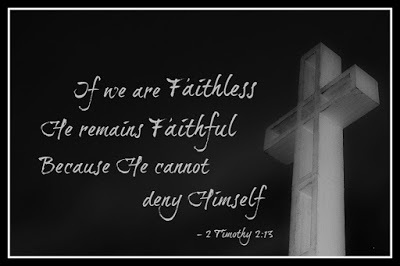 by Sarah Van Diest
by Sarah Van Diest
“If we are faithless, He remains faithful – for He cannot deny Himself” 2 Tim.2:13.
Am I…Too far gone for love to rescue,Too expired for love to breathe into, Too lost for love to find?
Sadness drapes itself over me. It wakes me by night to remind me of its presence and holds my hand by day, hinging me to the earth, guarding me from messages of hope, and shielding me from the light of the sun. It sings a low song of sorrow and defeat, its beat drumming out my downfall and demise. It claims ownership and demands acquiescence. Its mild exterior covers its wretchedness. Its humble and meek appearance veneers its brash and grotesque reality.
I long to shake it from my shoulders and break its grip on my soul. To rid my body, mind and heart of this overlayment that steals my joy is the desire that pushes me to seek Your love… to grope for You in this darkness.
 I push forward past the walls of disbelief and choose to trust Your love over my assessment of my worthlessness. I have not found my own calculations of who I am to render me enough, but I trust You. You say I am enough, and You say You love me. What arrogance is it that trusts my own computations over Yours?
I push forward past the walls of disbelief and choose to trust Your love over my assessment of my worthlessness. I have not found my own calculations of who I am to render me enough, but I trust You. You say I am enough, and You say You love me. What arrogance is it that trusts my own computations over Yours?
It is a moment, then another, and then another. Each moment I have a choice. The truth doesn’t change, but each moment offers me the chance to believe it or refuse it. Each moment I get to decide to walk with You or to walk with lies.
Sometimes…
…that ticks me off. I don’t like that it’s a choice. I don’t like that it’s up to me. I don’t want such responsibility. I want to be idle and submit to the forces that wish to draw me downstream. It’s so much easier and I am tired of fighting against my feelings that remind me of my worthlessness. It is those times, when I float down the river of lies, that I add to my sorrow a sense of expiration. I am too far gone for love to reach me. Too far gone for love to breathe into me. Too far gone for love. Period.
And then the choice emerges again. Do I believe the lies or trust the Father?
But sometimes…
 …on those deepest of sorrowful days, the choice is forgotten or muted. The call to look into my Savior’s eyes is drowned out by the waves of pain lapping in my ears. Down the river I go. Down where the current takes me, through the rough waters, over rocks and into whirlpools, over waterfalls. Down into the darkest depths. Submerged in frigid water and sinking to the bottom, my eyes close one final time.
…on those deepest of sorrowful days, the choice is forgotten or muted. The call to look into my Savior’s eyes is drowned out by the waves of pain lapping in my ears. Down the river I go. Down where the current takes me, through the rough waters, over rocks and into whirlpools, over waterfalls. Down into the darkest depths. Submerged in frigid water and sinking to the bottom, my eyes close one final time.
Pulled. Pushed. Turned and pushed on again, water forced from my lungs. Breath engulfing and overtaking. Eyes obliged open and my Savior’s face fills my view. I am saved. I am rescued. The anchor of sorrow, death and pain detach as my body is lifted effortlessly by the One who searched for me and found me; who left the 99 on shore to wade into the icy waters and pull me out.
I don’t understand. I didn’t make the good choice, Lord. I didn’t choose You today. I gave up. I stopped fighting. I lost the will to keep searching for You.
His voice trembles with the overflow of His devotion, “But I chose you! You are my child! I would not let you fall away. I would not let you be lost in the cold water. You are mine, and I will never lose you.”
It is up to us to make the choice to trust Him or not, but our destiny is not in our hands alone. It is not up to us to save ourselves. We are blessed when we choose life, but we are not lost if we fail. And we will fail. If our salvation from the things that threaten to undo us is in our hands only, if always making the right choices is what it means to be saved, then what is the faithfulness of God? What is the love our Father has for us? There are times we are helpless, even faithless, and wholly overcome…
“There is a time for everything,
and a season for every activity under the heavens:a time to be born…and die,
…a time to heal,
…to weep and to laugh,
…to mourn and to dance,
… a time to give up…. (Ecclesiastes 3:1-6 with omissions).
…but the One who made us and loves us is the One who saves.
“Our God is a God who saves; from the Sovereign LORD comes escape from death” Ps. 68:20.
I am never…Too far gone for love to rescue,Too expired for love to breathe into, Too lost for love to find.
 Sarah has worked in Christian publishing since 2005 as both and editor and an agent.
Sarah has worked in Christian publishing since 2005 as both and editor and an agent.
Currently, she works with her husband, David, in their agency, the Van Diest Literary Agency. Writing is a growing passion for her as she hopes to bring hope to hurting hearts.
 by Sarah Van Diest
by Sarah Van Diest“If we are faithless, He remains faithful – for He cannot deny Himself” 2 Tim.2:13.
Am I…Too far gone for love to rescue,Too expired for love to breathe into, Too lost for love to find?
Sadness drapes itself over me. It wakes me by night to remind me of its presence and holds my hand by day, hinging me to the earth, guarding me from messages of hope, and shielding me from the light of the sun. It sings a low song of sorrow and defeat, its beat drumming out my downfall and demise. It claims ownership and demands acquiescence. Its mild exterior covers its wretchedness. Its humble and meek appearance veneers its brash and grotesque reality.
I long to shake it from my shoulders and break its grip on my soul. To rid my body, mind and heart of this overlayment that steals my joy is the desire that pushes me to seek Your love… to grope for You in this darkness.
 I push forward past the walls of disbelief and choose to trust Your love over my assessment of my worthlessness. I have not found my own calculations of who I am to render me enough, but I trust You. You say I am enough, and You say You love me. What arrogance is it that trusts my own computations over Yours?
I push forward past the walls of disbelief and choose to trust Your love over my assessment of my worthlessness. I have not found my own calculations of who I am to render me enough, but I trust You. You say I am enough, and You say You love me. What arrogance is it that trusts my own computations over Yours? It is a moment, then another, and then another. Each moment I have a choice. The truth doesn’t change, but each moment offers me the chance to believe it or refuse it. Each moment I get to decide to walk with You or to walk with lies.
Sometimes…
…that ticks me off. I don’t like that it’s a choice. I don’t like that it’s up to me. I don’t want such responsibility. I want to be idle and submit to the forces that wish to draw me downstream. It’s so much easier and I am tired of fighting against my feelings that remind me of my worthlessness. It is those times, when I float down the river of lies, that I add to my sorrow a sense of expiration. I am too far gone for love to reach me. Too far gone for love to breathe into me. Too far gone for love. Period.
And then the choice emerges again. Do I believe the lies or trust the Father?
But sometimes…
 …on those deepest of sorrowful days, the choice is forgotten or muted. The call to look into my Savior’s eyes is drowned out by the waves of pain lapping in my ears. Down the river I go. Down where the current takes me, through the rough waters, over rocks and into whirlpools, over waterfalls. Down into the darkest depths. Submerged in frigid water and sinking to the bottom, my eyes close one final time.
…on those deepest of sorrowful days, the choice is forgotten or muted. The call to look into my Savior’s eyes is drowned out by the waves of pain lapping in my ears. Down the river I go. Down where the current takes me, through the rough waters, over rocks and into whirlpools, over waterfalls. Down into the darkest depths. Submerged in frigid water and sinking to the bottom, my eyes close one final time. Pulled. Pushed. Turned and pushed on again, water forced from my lungs. Breath engulfing and overtaking. Eyes obliged open and my Savior’s face fills my view. I am saved. I am rescued. The anchor of sorrow, death and pain detach as my body is lifted effortlessly by the One who searched for me and found me; who left the 99 on shore to wade into the icy waters and pull me out.
I don’t understand. I didn’t make the good choice, Lord. I didn’t choose You today. I gave up. I stopped fighting. I lost the will to keep searching for You.
His voice trembles with the overflow of His devotion, “But I chose you! You are my child! I would not let you fall away. I would not let you be lost in the cold water. You are mine, and I will never lose you.”
It is up to us to make the choice to trust Him or not, but our destiny is not in our hands alone. It is not up to us to save ourselves. We are blessed when we choose life, but we are not lost if we fail. And we will fail. If our salvation from the things that threaten to undo us is in our hands only, if always making the right choices is what it means to be saved, then what is the faithfulness of God? What is the love our Father has for us? There are times we are helpless, even faithless, and wholly overcome…
“There is a time for everything,
and a season for every activity under the heavens:a time to be born…and die,
…a time to heal,
…to weep and to laugh,
…to mourn and to dance,
… a time to give up…. (Ecclesiastes 3:1-6 with omissions).
…but the One who made us and loves us is the One who saves.
“Our God is a God who saves; from the Sovereign LORD comes escape from death” Ps. 68:20.
I am never…Too far gone for love to rescue,Too expired for love to breathe into, Too lost for love to find.
 Sarah has worked in Christian publishing since 2005 as both and editor and an agent.
Sarah has worked in Christian publishing since 2005 as both and editor and an agent. Currently, she works with her husband, David, in their agency, the Van Diest Literary Agency. Writing is a growing passion for her as she hopes to bring hope to hurting hearts.
Published on October 11, 2015 01:00
October 10, 2015
Defining Success — in Life and in Writing
by Beth Vogt @BethVogt
 "Success is walking from failure to failure with no loss of enthusiasm." Winston ChurchillPeople like to talk about success—they like to bandy about different definitions for it. Success is this. Success is that.
"Success is walking from failure to failure with no loss of enthusiasm." Winston ChurchillPeople like to talk about success—they like to bandy about different definitions for it. Success is this. Success is that.
And they’re all usually talking about something as far from failure as you can get.
I’ve been reading Alton Gansky’s book Imagination@ Work. (Alton’s a friend and a colleague. I admire him. Even if I didn’t know him, I’d recommend his book. It’s like a series of “here’s what I’ve been thinking about” conversations with a witty, intelligent guy.)
But back to the topic at hand: failure.
Alton poses the question: What would you do, if you knew you could not fail? (That is a topic for another blog.)
I answered his question by writing this question in my journal: How do you define failure?
And then I wrote:Success—less than
And by that I mean that what appears to be success in one person’s eyes can feel like a failure in someone else’s.
Say, for example, I land a book contract.
But I don’t earn out my advance.
Or I don’t win an award.
Or I don’t get offered a second contract.
Or I don’t ______________ (fill in the blank).
It’s the whole “being nibbled to death by ducks” experience. Turning success into failure because it wasn’t good enough.
But Beth, you say, Winston Churchill was talking about success—and defining it as facing failure enthusiastically.
I know. And I love his definition.
But Churchill got me thinking. And so did Alton. We need to enthusiastically face both our failures and our successes and not let the little duckies (dare I name them comparison and envy and disappointment?) nibble them all to pieces.
In Your Words: How do you define failure or success? And how do you face them with enthusiasm?
TWEETABLE
Defining success - in life and in #writing - via @BethVogt on @EdieMelson (Click to Tweet)
 Beth K. Vogt believes God’s best often waits behind the doors marked “Never.”
Beth K. Vogt believes God’s best often waits behind the doors marked “Never.”
A nonfiction writer and editor who said she’d never write fiction, Beth is now a novelist with Howard Books. She enjoys writing inspirational contemporary romance because she believes there’s more to happily-ever-after than the fairy tales tell us. Connect with Beth on her website, Twitter, Facebook, or check out her blog on quotes, In Others’ Words.
 "Success is walking from failure to failure with no loss of enthusiasm." Winston ChurchillPeople like to talk about success—they like to bandy about different definitions for it. Success is this. Success is that.
"Success is walking from failure to failure with no loss of enthusiasm." Winston ChurchillPeople like to talk about success—they like to bandy about different definitions for it. Success is this. Success is that.And they’re all usually talking about something as far from failure as you can get.
I’ve been reading Alton Gansky’s book Imagination@ Work. (Alton’s a friend and a colleague. I admire him. Even if I didn’t know him, I’d recommend his book. It’s like a series of “here’s what I’ve been thinking about” conversations with a witty, intelligent guy.)
But back to the topic at hand: failure.
Alton poses the question: What would you do, if you knew you could not fail? (That is a topic for another blog.)
I answered his question by writing this question in my journal: How do you define failure?
And then I wrote:Success—less than
And by that I mean that what appears to be success in one person’s eyes can feel like a failure in someone else’s.
Say, for example, I land a book contract.
But I don’t earn out my advance.
Or I don’t win an award.
Or I don’t get offered a second contract.
Or I don’t ______________ (fill in the blank).
It’s the whole “being nibbled to death by ducks” experience. Turning success into failure because it wasn’t good enough.
But Beth, you say, Winston Churchill was talking about success—and defining it as facing failure enthusiastically.
I know. And I love his definition.
But Churchill got me thinking. And so did Alton. We need to enthusiastically face both our failures and our successes and not let the little duckies (dare I name them comparison and envy and disappointment?) nibble them all to pieces.
In Your Words: How do you define failure or success? And how do you face them with enthusiasm?
TWEETABLE
Defining success - in life and in #writing - via @BethVogt on @EdieMelson (Click to Tweet)
 Beth K. Vogt believes God’s best often waits behind the doors marked “Never.”
Beth K. Vogt believes God’s best often waits behind the doors marked “Never.” A nonfiction writer and editor who said she’d never write fiction, Beth is now a novelist with Howard Books. She enjoys writing inspirational contemporary romance because she believes there’s more to happily-ever-after than the fairy tales tell us. Connect with Beth on her website, Twitter, Facebook, or check out her blog on quotes, In Others’ Words.
Published on October 10, 2015 01:00
October 9, 2015
Quick Tips for Writing a Synopsis
by Vonda Skelton @VondaSkelton
 You've just completed the Great American Novel. You've done everything you've been told to do. You've created compelling characters and plopped them right smack in the middle of emotional/physical conflict. You've engaged the reader with your perfectly executed plot and subplots. You've edited and proofed and allowed your baby to be critiqued by your writer's group.
You've just completed the Great American Novel. You've done everything you've been told to do. You've created compelling characters and plopped them right smack in the middle of emotional/physical conflict. You've engaged the reader with your perfectly executed plot and subplots. You've edited and proofed and allowed your baby to be critiqued by your writer's group.
Now it's time to share the pictures and see if anyone wants to hold her. So you register for a writer's conference where editors, agents, critiquers, and contest judges may ask for a synopsis.A what?
Although you'll find varying guidelines depending on the organization, here's a quick overview of what most people look for in a synopsis:[image error]The synopsis is a summary of the plot of your book that gives the reader a chance to see if it warrants a closer look.It's often limited to 1-3 pages, but in some cases, the page limit is much higher. Be sure to follow the guidelines of the organization you're submitting to.It's usually single-spaced with 1-inch margins on all sides. If you print it, be sure it's in black ink, on white paper, using a standard font (Times New Roman is most often used).It is written in present tense, third person.The synopsis must tell the ending of the story, even if the book is a mystery, thriller, or suspense novel. This is not the time to leave the editor/agent/judge/critiquer hanging and hope he or she will beg you to tell the ending. I've actually read a synopsis where the writer said something like, "I can't give away the ending because it's so unusual, but I'll just tell you, it's a real twist!" Hmmm. Not a good idea.Of course, you can't cover all the points of the book, but you'll want to include the major plots points that move the story along to a satisfactory ending.Give enough detail that the reader becomes engaged, but with a limit of 1-3 pages, you'll have to carefully decide what earns a place in the synopsis.
If you print it, be sure it's in black ink, on white paper, using a standard font (Times New Roman is most often used).It is written in present tense, third person.The synopsis must tell the ending of the story, even if the book is a mystery, thriller, or suspense novel. This is not the time to leave the editor/agent/judge/critiquer hanging and hope he or she will beg you to tell the ending. I've actually read a synopsis where the writer said something like, "I can't give away the ending because it's so unusual, but I'll just tell you, it's a real twist!" Hmmm. Not a good idea.Of course, you can't cover all the points of the book, but you'll want to include the major plots points that move the story along to a satisfactory ending.Give enough detail that the reader becomes engaged, but with a limit of 1-3 pages, you'll have to carefully decide what earns a place in the synopsis.
So, there you have it—a quick overview of the synopsis. Have you found other specifics that make for a quality synopsis? If so, join in the conversation and share it here!
TWEETABLES
Quick Tips for #Writing a Synopsis - via author @VondaSkelton on @EdieMelson (Click to Tweet)
Writing a synopsis doesn't have to be difficult - quick tips from @VondaSkelton on @EdieMelson (Click to Tweet)
 Vonda Skelton is a speaker and the author of four books: Seeing Through the Lies: Unmasking the Myths Women Believe and the 3-book Bitsy Burroughs mysteries for children 8-12 yo. She’s the founder and co-director of Christian Communicators Conference, offering speakers’ training and community for Christian women called to ministry. Vonda is a frequent instructor at writer’s conferences and keynotes at business, women’s, and associational events. You can find out more about Vonda, as well as writing opportunities and instruction at her writer’s blog, The Christian Writer’s Den at VondaSkelton.com.
Vonda Skelton is a speaker and the author of four books: Seeing Through the Lies: Unmasking the Myths Women Believe and the 3-book Bitsy Burroughs mysteries for children 8-12 yo. She’s the founder and co-director of Christian Communicators Conference, offering speakers’ training and community for Christian women called to ministry. Vonda is a frequent instructor at writer’s conferences and keynotes at business, women’s, and associational events. You can find out more about Vonda, as well as writing opportunities and instruction at her writer’s blog, The Christian Writer’s Den at VondaSkelton.com.
 You've just completed the Great American Novel. You've done everything you've been told to do. You've created compelling characters and plopped them right smack in the middle of emotional/physical conflict. You've engaged the reader with your perfectly executed plot and subplots. You've edited and proofed and allowed your baby to be critiqued by your writer's group.
You've just completed the Great American Novel. You've done everything you've been told to do. You've created compelling characters and plopped them right smack in the middle of emotional/physical conflict. You've engaged the reader with your perfectly executed plot and subplots. You've edited and proofed and allowed your baby to be critiqued by your writer's group.Now it's time to share the pictures and see if anyone wants to hold her. So you register for a writer's conference where editors, agents, critiquers, and contest judges may ask for a synopsis.A what?
Although you'll find varying guidelines depending on the organization, here's a quick overview of what most people look for in a synopsis:[image error]The synopsis is a summary of the plot of your book that gives the reader a chance to see if it warrants a closer look.It's often limited to 1-3 pages, but in some cases, the page limit is much higher. Be sure to follow the guidelines of the organization you're submitting to.It's usually single-spaced with 1-inch margins on all sides.
 If you print it, be sure it's in black ink, on white paper, using a standard font (Times New Roman is most often used).It is written in present tense, third person.The synopsis must tell the ending of the story, even if the book is a mystery, thriller, or suspense novel. This is not the time to leave the editor/agent/judge/critiquer hanging and hope he or she will beg you to tell the ending. I've actually read a synopsis where the writer said something like, "I can't give away the ending because it's so unusual, but I'll just tell you, it's a real twist!" Hmmm. Not a good idea.Of course, you can't cover all the points of the book, but you'll want to include the major plots points that move the story along to a satisfactory ending.Give enough detail that the reader becomes engaged, but with a limit of 1-3 pages, you'll have to carefully decide what earns a place in the synopsis.
If you print it, be sure it's in black ink, on white paper, using a standard font (Times New Roman is most often used).It is written in present tense, third person.The synopsis must tell the ending of the story, even if the book is a mystery, thriller, or suspense novel. This is not the time to leave the editor/agent/judge/critiquer hanging and hope he or she will beg you to tell the ending. I've actually read a synopsis where the writer said something like, "I can't give away the ending because it's so unusual, but I'll just tell you, it's a real twist!" Hmmm. Not a good idea.Of course, you can't cover all the points of the book, but you'll want to include the major plots points that move the story along to a satisfactory ending.Give enough detail that the reader becomes engaged, but with a limit of 1-3 pages, you'll have to carefully decide what earns a place in the synopsis.So, there you have it—a quick overview of the synopsis. Have you found other specifics that make for a quality synopsis? If so, join in the conversation and share it here!
TWEETABLES
Quick Tips for #Writing a Synopsis - via author @VondaSkelton on @EdieMelson (Click to Tweet)
Writing a synopsis doesn't have to be difficult - quick tips from @VondaSkelton on @EdieMelson (Click to Tweet)
 Vonda Skelton is a speaker and the author of four books: Seeing Through the Lies: Unmasking the Myths Women Believe and the 3-book Bitsy Burroughs mysteries for children 8-12 yo. She’s the founder and co-director of Christian Communicators Conference, offering speakers’ training and community for Christian women called to ministry. Vonda is a frequent instructor at writer’s conferences and keynotes at business, women’s, and associational events. You can find out more about Vonda, as well as writing opportunities and instruction at her writer’s blog, The Christian Writer’s Den at VondaSkelton.com.
Vonda Skelton is a speaker and the author of four books: Seeing Through the Lies: Unmasking the Myths Women Believe and the 3-book Bitsy Burroughs mysteries for children 8-12 yo. She’s the founder and co-director of Christian Communicators Conference, offering speakers’ training and community for Christian women called to ministry. Vonda is a frequent instructor at writer’s conferences and keynotes at business, women’s, and associational events. You can find out more about Vonda, as well as writing opportunities and instruction at her writer’s blog, The Christian Writer’s Den at VondaSkelton.com.
Published on October 09, 2015 01:00
October 8, 2015
Will TV/Film Kill the Literary Star?
by Warren Adler @WarrenAdler
 As a longtime practitioner of the art of fiction writing and a committed reader of the works of others, I have been thinking a great deal about the impact of the proliferating film/TV industry on the future of reading. Having lived through the golden age of Hollywood films shown in ubiquitous neighborhood theaters in the United States with outlets throughout the world, I hadn’t given much thought to the moving images’ actual impact on reading up until recently. Although there were voices that persisted in sounding the death knell of the novel, the popularity of novels and short stories never seemed challenged by the movies.The novelist as hero was a celebrated figure and outsized literary personalities like Earnest Hemingway, Sinclair Lewis, William Faulkner, John Steinbeck, Pearl Buck and numerous others were accorded celebrity status and given serious prizes on the national and international scene. The competition emanating from watching films did not seem to diminish the popularity of reading.
As a longtime practitioner of the art of fiction writing and a committed reader of the works of others, I have been thinking a great deal about the impact of the proliferating film/TV industry on the future of reading. Having lived through the golden age of Hollywood films shown in ubiquitous neighborhood theaters in the United States with outlets throughout the world, I hadn’t given much thought to the moving images’ actual impact on reading up until recently. Although there were voices that persisted in sounding the death knell of the novel, the popularity of novels and short stories never seemed challenged by the movies.The novelist as hero was a celebrated figure and outsized literary personalities like Earnest Hemingway, Sinclair Lewis, William Faulkner, John Steinbeck, Pearl Buck and numerous others were accorded celebrity status and given serious prizes on the national and international scene. The competition emanating from watching films did not seem to diminish the popularity of reading.
 In today’s world, visual storytelling of every conceivable variety is a worldwide staple surpassing in scope and volume what was churned out in Hollywood in its golden age and what was available on network television in the days when only a few select networks dominated the media. As the international demand for narrative film/TV content continues to soar with popular streaming services like Netflix and others the two questions then become: will the coming generations receive most of their entertainment through visual means rather than through the written word and will such a proliferation of narrative film/TV reduce the importance of reading? Growing examples of this trend include the diminishment of fiction in the common core curriculum, the ever-rising culture of computer games, the tsunami of streaming services of enormous international reach, and the blockbuster movies filled with special effects geared towards children and teenagers. Nor must we ignore the economic dangers that lie ahead for the written word. The narrative film industry is a moneymaker that dwarfs the publishing industry currently in the throes of financial revolution and disorder. As the distribution channels of the written word lose traction, the danger to its economic survival will become more and more evident. The other underlying question, of course, is does it really matter if the written word bows to the world of film/TV? From my perspective, any diminishment of fiction delivered by words is a loss for mankind and must be confronted. There is no greater human attribute than the imagination. It lies at the very soul of the human species. It is the brain’s most powerful engine. It is the essential muscle of life and like all muscles it must be exercised and perpetually strengthened.
In today’s world, visual storytelling of every conceivable variety is a worldwide staple surpassing in scope and volume what was churned out in Hollywood in its golden age and what was available on network television in the days when only a few select networks dominated the media. As the international demand for narrative film/TV content continues to soar with popular streaming services like Netflix and others the two questions then become: will the coming generations receive most of their entertainment through visual means rather than through the written word and will such a proliferation of narrative film/TV reduce the importance of reading? Growing examples of this trend include the diminishment of fiction in the common core curriculum, the ever-rising culture of computer games, the tsunami of streaming services of enormous international reach, and the blockbuster movies filled with special effects geared towards children and teenagers. Nor must we ignore the economic dangers that lie ahead for the written word. The narrative film industry is a moneymaker that dwarfs the publishing industry currently in the throes of financial revolution and disorder. As the distribution channels of the written word lose traction, the danger to its economic survival will become more and more evident. The other underlying question, of course, is does it really matter if the written word bows to the world of film/TV? From my perspective, any diminishment of fiction delivered by words is a loss for mankind and must be confronted. There is no greater human attribute than the imagination. It lies at the very soul of the human species. It is the brain’s most powerful engine. It is the essential muscle of life and like all muscles it must be exercised and perpetually strengthened.
 Writing and reading are the principal tools that inspire, create and empower our imagination without which we are bereft, muted and lesser. Anything that diminishes that power is the enemy of mankind. It should be known that I am not categorically opposed to the myriad manifestations of new media and technological advances. As an author who has always considered himself an entrepreneur I have always felt it necessary to adapt to evolving technology and modes of distribution. When SONY came out with the first viable reader, I was asked to make the first pitch for its use at the Las Vegas Consumer Electronic Show in 2007 along with my friend Nick Taylor, former President of the Author’s Guild. What’s more, a number of my novels are in various stages of development for film, TV, and live stage productions. Any serious novelist and entrepreneur can relate to the desire to share their work in as many mediums as possible, reaching a wider audience. My hope is that the written word will only stand to be enhanced and complemented by its visual counterparts, not pushed to the brink of extinction.
Writing and reading are the principal tools that inspire, create and empower our imagination without which we are bereft, muted and lesser. Anything that diminishes that power is the enemy of mankind. It should be known that I am not categorically opposed to the myriad manifestations of new media and technological advances. As an author who has always considered himself an entrepreneur I have always felt it necessary to adapt to evolving technology and modes of distribution. When SONY came out with the first viable reader, I was asked to make the first pitch for its use at the Las Vegas Consumer Electronic Show in 2007 along with my friend Nick Taylor, former President of the Author’s Guild. What’s more, a number of my novels are in various stages of development for film, TV, and live stage productions. Any serious novelist and entrepreneur can relate to the desire to share their work in as many mediums as possible, reaching a wider audience. My hope is that the written word will only stand to be enhanced and complemented by its visual counterparts, not pushed to the brink of extinction.
My argument here is for a greater, not a lesser emphasis on the written word as the paramount storytelling device ever invented for human communication beyond speech itself. Words conjure deeper, more creative possibilities of thought and interpretation than what is pre-packaged for our consideration. The heart of storytelling is the ultimate quest for “what happens next,” which motivates us to contemplate our mortality. It is the mystery of all human life, a necessary component of our existence. Where are we going? What is ahead? Is there anything beyond disintegration and the end of life? These are the primal questions behind the idea of storytelling. The imagination is indispensible to our existence and the speculations that reside in fiction, as presented in words, are the stimulant that facilitates that projection. I know this may sound a bit lofty and though there is arguably somewhat of a touch of pessimism in my essay, I know I am not alone. The canary in the coal mine is singing its song of warning. Of course, there are those who will present passionate arguments for the superiority of the moving image over the written word. Each has its place. My argument is for making the preservation of the art of the written word a priority and finding the right balance between it and the moving image.
TWEETABLES
Will TV/Film Kill the Literary Star - thoughts from @WarrenAder (Click to Tweet)
The Effects of TV/Film on the #Publishing Industry - via @WarrenAdler on @EdieMelson (Click to Tweet)
 Warren Adler is best known for The War of the Roses, his masterpiece fictionalization of a macabre divorce turned into the Golden Globe and BAFTA nominated dark comedy hit starring Michael Douglas, Kathleen Turner and Danny DeVito. Adler's international hit stage adaptation of the novel will premiere on Broadway in 2015-2016. Adler has also optioned and sold film rights for a number of his works including Random Hearts (starring Harrison Ford and Kristen Scott Thomas) and The Sunset Gang (produced by Linda Lavin for PBS' American Playhouse series starring Jerry Stiller, Uta Hagen, Harold Gould and Doris Roberts). In recent development are the Broadway Production of The War of the Roses, to be produced by Jay and Cindy Gutterman, The War of the Roses - The Children (Grey Eagle Films and Permut Presentations), a feature film adaptation of the sequel to Adler's iconic divorce story, Target Churchill (Grey Eagle Films and Solution Entertainment),Mourning Glory, to be adapted by Karen Leigh Hopkins, and Capitol Crimes (Grey Eagle Films and Sennet Entertainment), a television series based on his Fiona Fitzgerald mystery series. Warren Adler's newest thriller, Treadmill, is officially available.
Warren Adler is best known for The War of the Roses, his masterpiece fictionalization of a macabre divorce turned into the Golden Globe and BAFTA nominated dark comedy hit starring Michael Douglas, Kathleen Turner and Danny DeVito. Adler's international hit stage adaptation of the novel will premiere on Broadway in 2015-2016. Adler has also optioned and sold film rights for a number of his works including Random Hearts (starring Harrison Ford and Kristen Scott Thomas) and The Sunset Gang (produced by Linda Lavin for PBS' American Playhouse series starring Jerry Stiller, Uta Hagen, Harold Gould and Doris Roberts). In recent development are the Broadway Production of The War of the Roses, to be produced by Jay and Cindy Gutterman, The War of the Roses - The Children (Grey Eagle Films and Permut Presentations), a feature film adaptation of the sequel to Adler's iconic divorce story, Target Churchill (Grey Eagle Films and Solution Entertainment),Mourning Glory, to be adapted by Karen Leigh Hopkins, and Capitol Crimes (Grey Eagle Films and Sennet Entertainment), a television series based on his Fiona Fitzgerald mystery series. Warren Adler's newest thriller, Treadmill, is officially available.
 As a longtime practitioner of the art of fiction writing and a committed reader of the works of others, I have been thinking a great deal about the impact of the proliferating film/TV industry on the future of reading. Having lived through the golden age of Hollywood films shown in ubiquitous neighborhood theaters in the United States with outlets throughout the world, I hadn’t given much thought to the moving images’ actual impact on reading up until recently. Although there were voices that persisted in sounding the death knell of the novel, the popularity of novels and short stories never seemed challenged by the movies.The novelist as hero was a celebrated figure and outsized literary personalities like Earnest Hemingway, Sinclair Lewis, William Faulkner, John Steinbeck, Pearl Buck and numerous others were accorded celebrity status and given serious prizes on the national and international scene. The competition emanating from watching films did not seem to diminish the popularity of reading.
As a longtime practitioner of the art of fiction writing and a committed reader of the works of others, I have been thinking a great deal about the impact of the proliferating film/TV industry on the future of reading. Having lived through the golden age of Hollywood films shown in ubiquitous neighborhood theaters in the United States with outlets throughout the world, I hadn’t given much thought to the moving images’ actual impact on reading up until recently. Although there were voices that persisted in sounding the death knell of the novel, the popularity of novels and short stories never seemed challenged by the movies.The novelist as hero was a celebrated figure and outsized literary personalities like Earnest Hemingway, Sinclair Lewis, William Faulkner, John Steinbeck, Pearl Buck and numerous others were accorded celebrity status and given serious prizes on the national and international scene. The competition emanating from watching films did not seem to diminish the popularity of reading.
 In today’s world, visual storytelling of every conceivable variety is a worldwide staple surpassing in scope and volume what was churned out in Hollywood in its golden age and what was available on network television in the days when only a few select networks dominated the media. As the international demand for narrative film/TV content continues to soar with popular streaming services like Netflix and others the two questions then become: will the coming generations receive most of their entertainment through visual means rather than through the written word and will such a proliferation of narrative film/TV reduce the importance of reading? Growing examples of this trend include the diminishment of fiction in the common core curriculum, the ever-rising culture of computer games, the tsunami of streaming services of enormous international reach, and the blockbuster movies filled with special effects geared towards children and teenagers. Nor must we ignore the economic dangers that lie ahead for the written word. The narrative film industry is a moneymaker that dwarfs the publishing industry currently in the throes of financial revolution and disorder. As the distribution channels of the written word lose traction, the danger to its economic survival will become more and more evident. The other underlying question, of course, is does it really matter if the written word bows to the world of film/TV? From my perspective, any diminishment of fiction delivered by words is a loss for mankind and must be confronted. There is no greater human attribute than the imagination. It lies at the very soul of the human species. It is the brain’s most powerful engine. It is the essential muscle of life and like all muscles it must be exercised and perpetually strengthened.
In today’s world, visual storytelling of every conceivable variety is a worldwide staple surpassing in scope and volume what was churned out in Hollywood in its golden age and what was available on network television in the days when only a few select networks dominated the media. As the international demand for narrative film/TV content continues to soar with popular streaming services like Netflix and others the two questions then become: will the coming generations receive most of their entertainment through visual means rather than through the written word and will such a proliferation of narrative film/TV reduce the importance of reading? Growing examples of this trend include the diminishment of fiction in the common core curriculum, the ever-rising culture of computer games, the tsunami of streaming services of enormous international reach, and the blockbuster movies filled with special effects geared towards children and teenagers. Nor must we ignore the economic dangers that lie ahead for the written word. The narrative film industry is a moneymaker that dwarfs the publishing industry currently in the throes of financial revolution and disorder. As the distribution channels of the written word lose traction, the danger to its economic survival will become more and more evident. The other underlying question, of course, is does it really matter if the written word bows to the world of film/TV? From my perspective, any diminishment of fiction delivered by words is a loss for mankind and must be confronted. There is no greater human attribute than the imagination. It lies at the very soul of the human species. It is the brain’s most powerful engine. It is the essential muscle of life and like all muscles it must be exercised and perpetually strengthened.
 Writing and reading are the principal tools that inspire, create and empower our imagination without which we are bereft, muted and lesser. Anything that diminishes that power is the enemy of mankind. It should be known that I am not categorically opposed to the myriad manifestations of new media and technological advances. As an author who has always considered himself an entrepreneur I have always felt it necessary to adapt to evolving technology and modes of distribution. When SONY came out with the first viable reader, I was asked to make the first pitch for its use at the Las Vegas Consumer Electronic Show in 2007 along with my friend Nick Taylor, former President of the Author’s Guild. What’s more, a number of my novels are in various stages of development for film, TV, and live stage productions. Any serious novelist and entrepreneur can relate to the desire to share their work in as many mediums as possible, reaching a wider audience. My hope is that the written word will only stand to be enhanced and complemented by its visual counterparts, not pushed to the brink of extinction.
Writing and reading are the principal tools that inspire, create and empower our imagination without which we are bereft, muted and lesser. Anything that diminishes that power is the enemy of mankind. It should be known that I am not categorically opposed to the myriad manifestations of new media and technological advances. As an author who has always considered himself an entrepreneur I have always felt it necessary to adapt to evolving technology and modes of distribution. When SONY came out with the first viable reader, I was asked to make the first pitch for its use at the Las Vegas Consumer Electronic Show in 2007 along with my friend Nick Taylor, former President of the Author’s Guild. What’s more, a number of my novels are in various stages of development for film, TV, and live stage productions. Any serious novelist and entrepreneur can relate to the desire to share their work in as many mediums as possible, reaching a wider audience. My hope is that the written word will only stand to be enhanced and complemented by its visual counterparts, not pushed to the brink of extinction.My argument here is for a greater, not a lesser emphasis on the written word as the paramount storytelling device ever invented for human communication beyond speech itself. Words conjure deeper, more creative possibilities of thought and interpretation than what is pre-packaged for our consideration. The heart of storytelling is the ultimate quest for “what happens next,” which motivates us to contemplate our mortality. It is the mystery of all human life, a necessary component of our existence. Where are we going? What is ahead? Is there anything beyond disintegration and the end of life? These are the primal questions behind the idea of storytelling. The imagination is indispensible to our existence and the speculations that reside in fiction, as presented in words, are the stimulant that facilitates that projection. I know this may sound a bit lofty and though there is arguably somewhat of a touch of pessimism in my essay, I know I am not alone. The canary in the coal mine is singing its song of warning. Of course, there are those who will present passionate arguments for the superiority of the moving image over the written word. Each has its place. My argument is for making the preservation of the art of the written word a priority and finding the right balance between it and the moving image.
TWEETABLES
Will TV/Film Kill the Literary Star - thoughts from @WarrenAder (Click to Tweet)
The Effects of TV/Film on the #Publishing Industry - via @WarrenAdler on @EdieMelson (Click to Tweet)
 Warren Adler is best known for The War of the Roses, his masterpiece fictionalization of a macabre divorce turned into the Golden Globe and BAFTA nominated dark comedy hit starring Michael Douglas, Kathleen Turner and Danny DeVito. Adler's international hit stage adaptation of the novel will premiere on Broadway in 2015-2016. Adler has also optioned and sold film rights for a number of his works including Random Hearts (starring Harrison Ford and Kristen Scott Thomas) and The Sunset Gang (produced by Linda Lavin for PBS' American Playhouse series starring Jerry Stiller, Uta Hagen, Harold Gould and Doris Roberts). In recent development are the Broadway Production of The War of the Roses, to be produced by Jay and Cindy Gutterman, The War of the Roses - The Children (Grey Eagle Films and Permut Presentations), a feature film adaptation of the sequel to Adler's iconic divorce story, Target Churchill (Grey Eagle Films and Solution Entertainment),Mourning Glory, to be adapted by Karen Leigh Hopkins, and Capitol Crimes (Grey Eagle Films and Sennet Entertainment), a television series based on his Fiona Fitzgerald mystery series. Warren Adler's newest thriller, Treadmill, is officially available.
Warren Adler is best known for The War of the Roses, his masterpiece fictionalization of a macabre divorce turned into the Golden Globe and BAFTA nominated dark comedy hit starring Michael Douglas, Kathleen Turner and Danny DeVito. Adler's international hit stage adaptation of the novel will premiere on Broadway in 2015-2016. Adler has also optioned and sold film rights for a number of his works including Random Hearts (starring Harrison Ford and Kristen Scott Thomas) and The Sunset Gang (produced by Linda Lavin for PBS' American Playhouse series starring Jerry Stiller, Uta Hagen, Harold Gould and Doris Roberts). In recent development are the Broadway Production of The War of the Roses, to be produced by Jay and Cindy Gutterman, The War of the Roses - The Children (Grey Eagle Films and Permut Presentations), a feature film adaptation of the sequel to Adler's iconic divorce story, Target Churchill (Grey Eagle Films and Solution Entertainment),Mourning Glory, to be adapted by Karen Leigh Hopkins, and Capitol Crimes (Grey Eagle Films and Sennet Entertainment), a television series based on his Fiona Fitzgerald mystery series. Warren Adler's newest thriller, Treadmill, is officially available.
Published on October 08, 2015 01:00
October 7, 2015
The Love/Hate Relationship between Writers & Word Count
by Edie Melson @EdieMelson
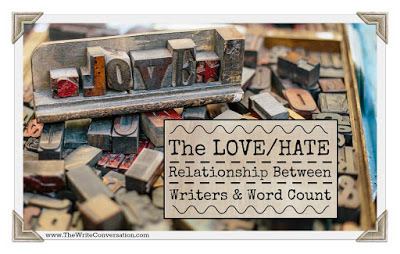 Sometimes our lives seem governed by word count.As working writers, our lives sometimes seem governed by word count. We use these numbers to set goals, define projects and sometimes even determine our victories. But it’s important to also view these numbers as a guide to show us how far we’ve come.
Sometimes our lives seem governed by word count.As working writers, our lives sometimes seem governed by word count. We use these numbers to set goals, define projects and sometimes even determine our victories. But it’s important to also view these numbers as a guide to show us how far we’ve come.
I remember in high school—the anguish I felt when an English teacher assigned a 500-word essay. Pulling together that many words in an original sequence seemed an almost impossible task. I spent hours looking for places to add the words that, the, and of course and. Of course back then, essays were written long-hand. No quick check in MS Word or an easy way to add in extras here and there.Yes, I’m old. Don’t rub it in.
I would write a paragraph, and then stop to count the words, working to make the required 500 without going over too much. It was agony.
Today my issue is a different one.
 When did 500 words morph from too many to too few?Now, when I get a writing assignment like a guest blog post, and I see that the word count is 500 words I still groan, but for a much different reason. I wonder how on earth I can say something worthwhile in only 500 words.
When did 500 words morph from too many to too few?Now, when I get a writing assignment like a guest blog post, and I see that the word count is 500 words I still groan, but for a much different reason. I wonder how on earth I can say something worthwhile in only 500 words.
When exactly did 500 words morph from too many to too few?
After I decided to take up writing full-time, I began by trying to write fiction. My words overflowed the page. Flowery phrases dotted my chapters as I tried to translate what was in my mind into the black and white of letters and words.
Adverbs and adjectives were my best buddies.
Then I started taking classes, attending conferences and sharing my writing with critique partners. The pages began to bleed red as my darlings were murdered. But I learned the skill of a single active verb and a strong noun.
 I laid aside my fiction endeavors to earn some money.I laid aside my fiction endeavors to earn some money. That meant freelance writing—articles, blog posts, and writing copy (advertising). I no longer felt compelled to put down every word that came into my head and I learned how to write tight, making every word count. For a while I did copy writing for a well-known Christian publisher. I would get a book and have to write a 300-word blurb, a 100-word blurb, a 50-word blurb, a 25-word hook, a 20-word hook, and a 12-word hook. I reveled in the ability to convey an idea in such a short space.
I laid aside my fiction endeavors to earn some money.I laid aside my fiction endeavors to earn some money. That meant freelance writing—articles, blog posts, and writing copy (advertising). I no longer felt compelled to put down every word that came into my head and I learned how to write tight, making every word count. For a while I did copy writing for a well-known Christian publisher. I would get a book and have to write a 300-word blurb, a 100-word blurb, a 50-word blurb, a 25-word hook, a 20-word hook, and a 12-word hook. I reveled in the ability to convey an idea in such a short space.
Then the opportunity came to revisit book-length projects. With my newfound skills, I once again struggled to find words. But this time I measured them by their quality not their quantity. I dug deeper instead of wider and my books became reality.
In some ways I’m right where I started. In other ways, not so much. Now word count is my friend, not my enemy.
This is my path, my love/hate relationship with word count. I’d like to hear yours. Share your thoughts in the comments section below.
Don’t forget to join the conversation!Blessings,Edie
PS. This blog post comes in at exactly 500 words, minus the title and tweetables.
TWEETABLESToo many - Too few? Word count from a writer’s perspective –via @EdieMelson (Click to Tweet)
The love/hate relationship between writers & word count –via @EdieMelson (Click to Tweet)
 Sometimes our lives seem governed by word count.As working writers, our lives sometimes seem governed by word count. We use these numbers to set goals, define projects and sometimes even determine our victories. But it’s important to also view these numbers as a guide to show us how far we’ve come.
Sometimes our lives seem governed by word count.As working writers, our lives sometimes seem governed by word count. We use these numbers to set goals, define projects and sometimes even determine our victories. But it’s important to also view these numbers as a guide to show us how far we’ve come.I remember in high school—the anguish I felt when an English teacher assigned a 500-word essay. Pulling together that many words in an original sequence seemed an almost impossible task. I spent hours looking for places to add the words that, the, and of course and. Of course back then, essays were written long-hand. No quick check in MS Word or an easy way to add in extras here and there.Yes, I’m old. Don’t rub it in.
I would write a paragraph, and then stop to count the words, working to make the required 500 without going over too much. It was agony.
Today my issue is a different one.
 When did 500 words morph from too many to too few?Now, when I get a writing assignment like a guest blog post, and I see that the word count is 500 words I still groan, but for a much different reason. I wonder how on earth I can say something worthwhile in only 500 words.
When did 500 words morph from too many to too few?Now, when I get a writing assignment like a guest blog post, and I see that the word count is 500 words I still groan, but for a much different reason. I wonder how on earth I can say something worthwhile in only 500 words. When exactly did 500 words morph from too many to too few?
After I decided to take up writing full-time, I began by trying to write fiction. My words overflowed the page. Flowery phrases dotted my chapters as I tried to translate what was in my mind into the black and white of letters and words.
Adverbs and adjectives were my best buddies.
Then I started taking classes, attending conferences and sharing my writing with critique partners. The pages began to bleed red as my darlings were murdered. But I learned the skill of a single active verb and a strong noun.
 I laid aside my fiction endeavors to earn some money.I laid aside my fiction endeavors to earn some money. That meant freelance writing—articles, blog posts, and writing copy (advertising). I no longer felt compelled to put down every word that came into my head and I learned how to write tight, making every word count. For a while I did copy writing for a well-known Christian publisher. I would get a book and have to write a 300-word blurb, a 100-word blurb, a 50-word blurb, a 25-word hook, a 20-word hook, and a 12-word hook. I reveled in the ability to convey an idea in such a short space.
I laid aside my fiction endeavors to earn some money.I laid aside my fiction endeavors to earn some money. That meant freelance writing—articles, blog posts, and writing copy (advertising). I no longer felt compelled to put down every word that came into my head and I learned how to write tight, making every word count. For a while I did copy writing for a well-known Christian publisher. I would get a book and have to write a 300-word blurb, a 100-word blurb, a 50-word blurb, a 25-word hook, a 20-word hook, and a 12-word hook. I reveled in the ability to convey an idea in such a short space.Then the opportunity came to revisit book-length projects. With my newfound skills, I once again struggled to find words. But this time I measured them by their quality not their quantity. I dug deeper instead of wider and my books became reality.
In some ways I’m right where I started. In other ways, not so much. Now word count is my friend, not my enemy.
This is my path, my love/hate relationship with word count. I’d like to hear yours. Share your thoughts in the comments section below.
Don’t forget to join the conversation!Blessings,Edie
PS. This blog post comes in at exactly 500 words, minus the title and tweetables.
TWEETABLESToo many - Too few? Word count from a writer’s perspective –via @EdieMelson (Click to Tweet)
The love/hate relationship between writers & word count –via @EdieMelson (Click to Tweet)
Published on October 07, 2015 01:00
October 6, 2015
Time Management Tips for Writers
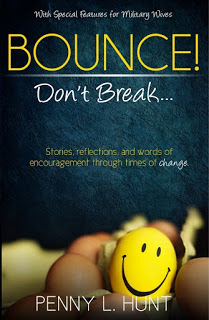 Edie here. I'm so excited to introduce you a friend of mine and share some of her insight about time management for writers.
Edie here. I'm so excited to introduce you a friend of mine and share some of her insight about time management for writers. Penny and I met while I was working on my first book for military families (she has a piece in Fighting Fear: Winning the War at Home When Your Soldier Leaves for Battle).
Now she has a wonderful new book, Bounce! Don't Break.. .coming out this month. Be sure to check out this encouragement for when life hits hard.It's available now for pre-order!
When You Can't Do It All
by Penny Hunt @PennyLHunt
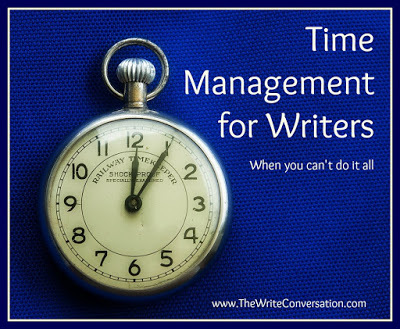 Is it better to meet a deadline late—or submit an un-edited piece?
Is it better to meet a deadline late—or submit an un-edited piece? Late is awful. It always ends up sounding like: “My schedule is more important that yours.”
Un-edited is worse. That’s like attaching a note that reads: “You’re not worth the effort.”
It is a terrible choice to have to make but a nightmare every writer faces.I personally choose late over un-edited with promises for a smooth to follow. We all live in the same world and, though missing a deadline certainly is unprofessional and, yes, could cost you the job, if you’re lucky your client will understand and eventually get over it. You then have the opportunity to make it up to them by under-promising and over-delivering.
 Submitting an un-edited piece for publication is written proof you’re not a pro and could end up haunting you for a long, long time. There’s no walking the cat back if, God forbid, your client rushes to deadline and publishes the work without first having read and/or editing it themselves.
Submitting an un-edited piece for publication is written proof you’re not a pro and could end up haunting you for a long, long time. There’s no walking the cat back if, God forbid, your client rushes to deadline and publishes the work without first having read and/or editing it themselves. So, what are you to do when life gets totally crazy and you lose all control over the illusion of control? With no claim toward being a time-management expert, here are six things that help me bounce instead of breaking when I begin feeling like half an orange placed in a juice press:
Cry, Sing, Pray: Cry—admit that you messed up and need God to help you. Sing—Jesus Loves Me out loud, like a prayer, focusing especially on the words, “We are weak, but He is strong.” Pray—And then trust that everything will eventually work out as you continue to work, doing the best you can. “Commit your way to the LORD; trust in Him, and He will do this.” Psalm 37:5
Kill the snake closest to you: Let the urgent go and take care of the important. Author Steven Pressfield says it well, “I am keenly aware of the Principle of Priority, which states (a) you must know the difference between what is urgent and what is important and (b) you must do what is important first. What’s important is the work.” Take a five minute break and watch this video about how to prioritize by Marie Forleo I am one of her biggest fans! https://www.youtube.com/watch?v=y4jr52uaUPw
 Think like a magician: “And now, for my nexttrick…” Do one thing at a time. Focus on the task at hand and let everything else go. Eliminate the unproductive and stressful process of task-switching. When one task is complete, move on to the next with a feeling of accomplishment as you check it off of the to-do list.
Think like a magician: “And now, for my nexttrick…” Do one thing at a time. Focus on the task at hand and let everything else go. Eliminate the unproductive and stressful process of task-switching. When one task is complete, move on to the next with a feeling of accomplishment as you check it off of the to-do list.Cheat: Get up an hour or two earlier than everyone else. Shower, dress for the day and put in a couple of hours of work before breakfast.
Be OK with the chaos: Do what you can to get organized and clear the clutter but don’t be too hard on yourself if, at the end of the day if everything is not just so, completed and in its place. Stack the papers on your desk, make a path through the toys and drape a clean kitchen towel over the dirty dishes in the sink.
Make a list: Before you go to bed each night make a list of the six most important things you have to do tomorrow. While you sleep your subconscious will prioritize the list. Don’t get it all done the next day? That’s OK. Just list it again as one of the six most important things to do tomorrow and keep doing that each night until you git ‘er done!
Bonus: I also use a white board that’s in my face all day to keep a running list of the big chunks that need doing and love using my Expo Eraser to obliterate them!
Don’t give up and for the love of God—keep writing!
What tips do you have for time management for writers? Be sure to share your thoughts in the comments section below.
Don’t forget to join the conversation!
TWEETABLESTime management tipsfor writers from @PennyLHunt on @EdieMelson (Click to Tweet)
#Writing time doesn’thave to get away from you - tips from @PennyLHunt on @EdieMelson (Click to Tweet)
Bounce! Don't Break... by Penny L Hunt
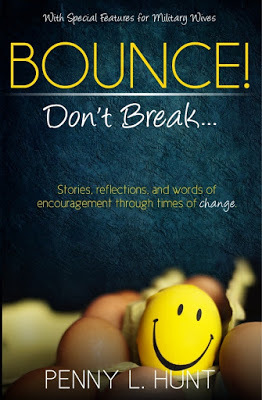 When life T-bones you like an eighteen-wheeler, Bounce! Don’t Break… will unearth the tools needed to successfully navigate the choppy waters of change and build resilience along the way. You will discover important steps to help you bounce-back after a crisis as you learn to shift your focus from the problem to the solution. With God’s help you can begin again as He converts your defeat into victory.
When life T-bones you like an eighteen-wheeler, Bounce! Don’t Break… will unearth the tools needed to successfully navigate the choppy waters of change and build resilience along the way. You will discover important steps to help you bounce-back after a crisis as you learn to shift your focus from the problem to the solution. With God’s help you can begin again as He converts your defeat into victory.Woven together with the author’s personal life-lessons and reflections are the real-life experiences of other women who, through the healing power of faith and hope, have emerged stronger and more authentic through the unwanted changes of life. With a warm mix of humor, wit and no-nonsense practicality, Penny L. Hunt leads the way to a Bounce! Don’t Break… mindset and life – even in the toughest of times.
 Penny L. Hunt, Amazon.com bestselling author and speaker is the wife of a retired career naval office and attaché. Her latest book, Bounce! Don’t Break… offers stories, reflections and words of encouragement through times of change and includes special features for Military Wives.
Penny L. Hunt, Amazon.com bestselling author and speaker is the wife of a retired career naval office and attaché. Her latest book, Bounce! Don’t Break… offers stories, reflections and words of encouragement through times of change and includes special features for Military Wives. The mother of five (yours, mine and ours) with twenty-nine moves that have taken her from the east coast of the USA across the Pacific to Hawaii, the Atlantic to Europe, and the Gulf of Mexico to South America and back, Penny is an expert in dealing with change as the personification of a “Bounce Back Kid!”She may be contacted at: www.PennyLHunt.com
Follow her on Facebook: https://www.facebook.com/AuthorPennyLHunt Twitter: https://twitter.com/PennyLHunt
Published on October 06, 2015 01:00
October 5, 2015
Tips for Getting More Comments on Your Blog—Blogging for Writers, Part 5
by Edie Melson @EdieMelson
 Even today—with as many blogs on the Internet as there are—blogging is still a valuable part of building and maintaining an online community. But it’s rare for a blog to take hold and grow—if it’s not a place where comments proliferate. Almost no one likes to be lectured, and that’s what a blog can feel with it the conversation is only one-sided.I’ll go one step further and add this comparison. Your blog is your Internet home. And because it’s your home, you are responsible for being a good host and making people feel welcome.
Even today—with as many blogs on the Internet as there are—blogging is still a valuable part of building and maintaining an online community. But it’s rare for a blog to take hold and grow—if it’s not a place where comments proliferate. Almost no one likes to be lectured, and that’s what a blog can feel with it the conversation is only one-sided.I’ll go one step further and add this comparison. Your blog is your Internet home. And because it’s your home, you are responsible for being a good host and making people feel welcome.
Facilitating conversation is just one of the duties of a good host, but it’s the one I want to concentrate on today as I share tips for getting more comments on your blog.
1. Give your readers someone to relate to. This means making sure they know who wrote the blog post. Ideally the blog post should have a byline—like my name at the top of this post. Butat the least, end with your name. (A byline also helps with your name recognition on search engines, but that's a post for another time.) It's very hard to join a conversation when you don't know who you're talking to.
 Keep the post focused & don't wander
Keep the post focused & don't wander
too far away from the topic.2. Keep the post focused and don’t wander too far away from the topic. If we try to cover too much area, people won’t be comfortable commenting.
3. Make sure the post isn’t too long.If we take up too much of your audience’s time, they won’t be able to stay and chat.
4. Watch the blog formatting. Even with interesting posts, people will still do some skimming. If we have headers, bullet points and/or lists they can still join the conversation.
 Try to end the post with an open-ended question.5. Try to end the post with an open-ended question. People don’t always know what’s appropriate to share. By asking a question, we give them the direction they need to chime in. Remember, as a host, it’s our job not to just facilitate the conversation, but we’re responsible for starting it.
Try to end the post with an open-ended question.5. Try to end the post with an open-ended question. People don’t always know what’s appropriate to share. By asking a question, we give them the direction they need to chime in. Remember, as a host, it’s our job not to just facilitate the conversation, but we’re responsible for starting it.
6. Share your own personal experience. If we’re asking someone else to share, we need to make sure our blogs are a safe place for that. Going first rarely feels safe. So I always try to make sure I share my own experience before asking my readers to share theirs.
7. Ask readers to share an experience that relates to the post. Sometimes a blog post won’t lend itself to a question. In those instances we can encourage our audience to share their experience.
8. Ask readers to add to a list of suggestions or tips that have been shared. I do that a lot on here. (And I’ll do it at the end of this post.) Again, if a question isn’t appropriate or feel right, ask them to contribute to the topic already introduced.
9. Avoid using the pronoun you.This is especially true if the post is pointing out something negative. Using the word you carries a finger-pointing connotation that we want to avoid. For example, in point number 1 above, I would never say, “you must make sure the answer to the question isn’t just yes or no.” Instead, I phrased it, “We must make sure the answer to the question isn’t just yes or no.”
10. Don’t ignore your guests. If people are kind enough to comment, you need to return the favor and continue the conversation. There are exceptions, if you have more than 20 comments, or if they are very similar, it’s find to answer a couple of people at a time.
11. Remind your guests to leave a comment below. Don’t apologize by saying, "if you feel comfortable" or "if you want." Just tell them what you’d like them to do. Sometimes that’s just what someone need to be able to work up the courage to join in.
Now it's your turn. What prompts you to leave a comment on a blog? What has worked for you when you're trying to get readers to join the conversation? Be sure to leave your thoughts in the comments section below.
Blessings,
Edie
TWEETABLES
11 Tips for Getting More Comments on Your Blog - via #Blogging expert @EdieMelson (Click to Tweet)
#Blogging for Writers - @EdieMelson shares how to get more comments on your posts (Click to Tweet)
If you've missed the previous posts in this series, here are the direct links:
Blogging For Writers
Part 1 - Blog or Website, Which Does a Writer Really Need
Part 2 - So What Do I Blog About
Part 3 - The Dos & Don'ts of Blogging
Part 4 - How Fast Should a Blog Grow
 Even today—with as many blogs on the Internet as there are—blogging is still a valuable part of building and maintaining an online community. But it’s rare for a blog to take hold and grow—if it’s not a place where comments proliferate. Almost no one likes to be lectured, and that’s what a blog can feel with it the conversation is only one-sided.I’ll go one step further and add this comparison. Your blog is your Internet home. And because it’s your home, you are responsible for being a good host and making people feel welcome.
Even today—with as many blogs on the Internet as there are—blogging is still a valuable part of building and maintaining an online community. But it’s rare for a blog to take hold and grow—if it’s not a place where comments proliferate. Almost no one likes to be lectured, and that’s what a blog can feel with it the conversation is only one-sided.I’ll go one step further and add this comparison. Your blog is your Internet home. And because it’s your home, you are responsible for being a good host and making people feel welcome.Facilitating conversation is just one of the duties of a good host, but it’s the one I want to concentrate on today as I share tips for getting more comments on your blog.
1. Give your readers someone to relate to. This means making sure they know who wrote the blog post. Ideally the blog post should have a byline—like my name at the top of this post. Butat the least, end with your name. (A byline also helps with your name recognition on search engines, but that's a post for another time.) It's very hard to join a conversation when you don't know who you're talking to.
 Keep the post focused & don't wander
Keep the post focused & don't wandertoo far away from the topic.2. Keep the post focused and don’t wander too far away from the topic. If we try to cover too much area, people won’t be comfortable commenting.
3. Make sure the post isn’t too long.If we take up too much of your audience’s time, they won’t be able to stay and chat.
4. Watch the blog formatting. Even with interesting posts, people will still do some skimming. If we have headers, bullet points and/or lists they can still join the conversation.
 Try to end the post with an open-ended question.5. Try to end the post with an open-ended question. People don’t always know what’s appropriate to share. By asking a question, we give them the direction they need to chime in. Remember, as a host, it’s our job not to just facilitate the conversation, but we’re responsible for starting it.
Try to end the post with an open-ended question.5. Try to end the post with an open-ended question. People don’t always know what’s appropriate to share. By asking a question, we give them the direction they need to chime in. Remember, as a host, it’s our job not to just facilitate the conversation, but we’re responsible for starting it.6. Share your own personal experience. If we’re asking someone else to share, we need to make sure our blogs are a safe place for that. Going first rarely feels safe. So I always try to make sure I share my own experience before asking my readers to share theirs.
7. Ask readers to share an experience that relates to the post. Sometimes a blog post won’t lend itself to a question. In those instances we can encourage our audience to share their experience.
8. Ask readers to add to a list of suggestions or tips that have been shared. I do that a lot on here. (And I’ll do it at the end of this post.) Again, if a question isn’t appropriate or feel right, ask them to contribute to the topic already introduced.
9. Avoid using the pronoun you.This is especially true if the post is pointing out something negative. Using the word you carries a finger-pointing connotation that we want to avoid. For example, in point number 1 above, I would never say, “you must make sure the answer to the question isn’t just yes or no.” Instead, I phrased it, “We must make sure the answer to the question isn’t just yes or no.”
10. Don’t ignore your guests. If people are kind enough to comment, you need to return the favor and continue the conversation. There are exceptions, if you have more than 20 comments, or if they are very similar, it’s find to answer a couple of people at a time.
11. Remind your guests to leave a comment below. Don’t apologize by saying, "if you feel comfortable" or "if you want." Just tell them what you’d like them to do. Sometimes that’s just what someone need to be able to work up the courage to join in.
Now it's your turn. What prompts you to leave a comment on a blog? What has worked for you when you're trying to get readers to join the conversation? Be sure to leave your thoughts in the comments section below.
Blessings,
Edie
TWEETABLES
11 Tips for Getting More Comments on Your Blog - via #Blogging expert @EdieMelson (Click to Tweet)
#Blogging for Writers - @EdieMelson shares how to get more comments on your posts (Click to Tweet)
If you've missed the previous posts in this series, here are the direct links:
Blogging For Writers
Part 1 - Blog or Website, Which Does a Writer Really Need
Part 2 - So What Do I Blog About
Part 3 - The Dos & Don'ts of Blogging
Part 4 - How Fast Should a Blog Grow
Published on October 05, 2015 01:00



